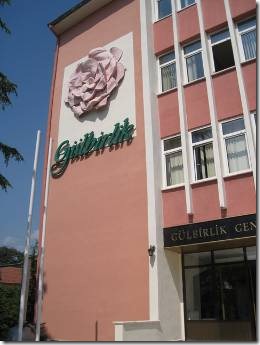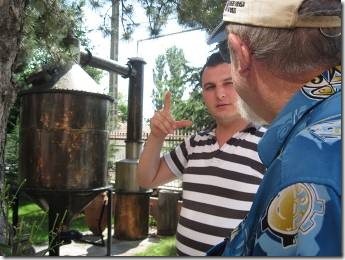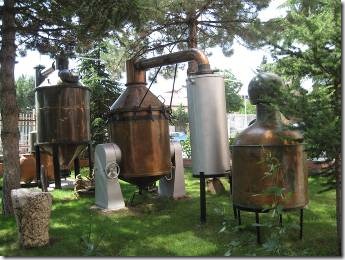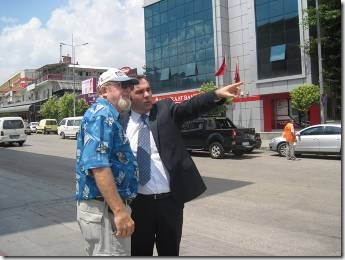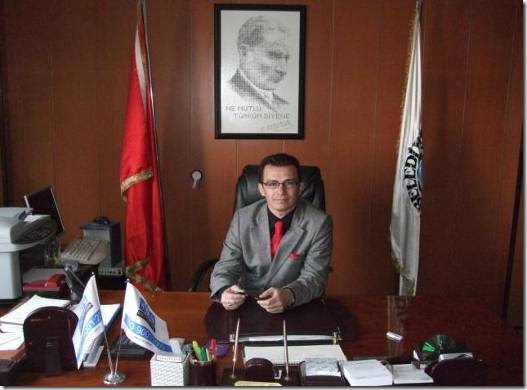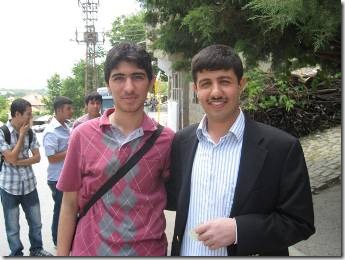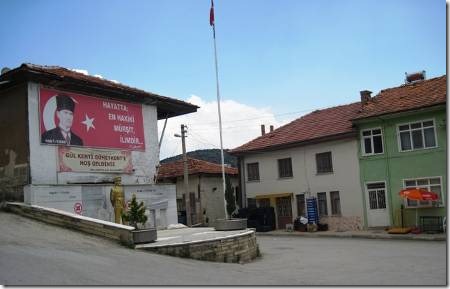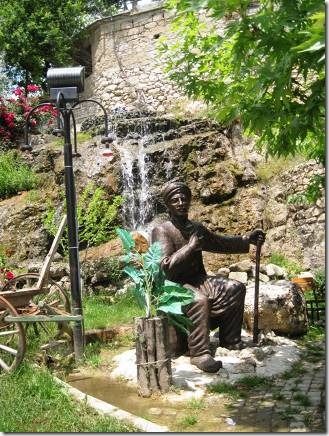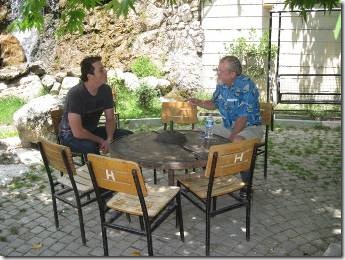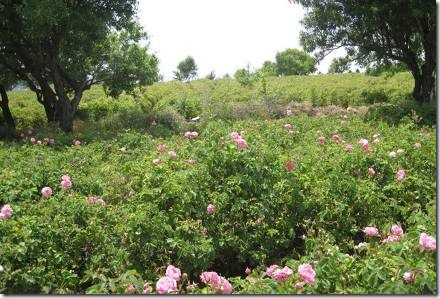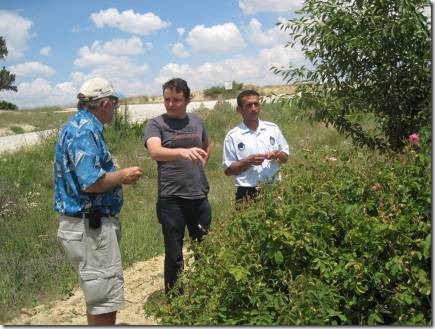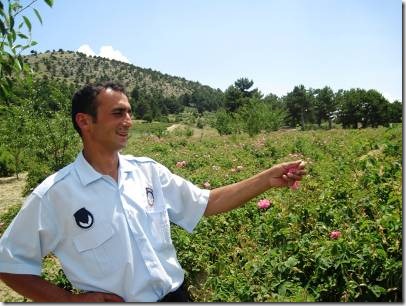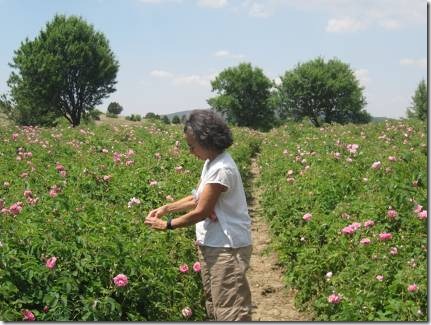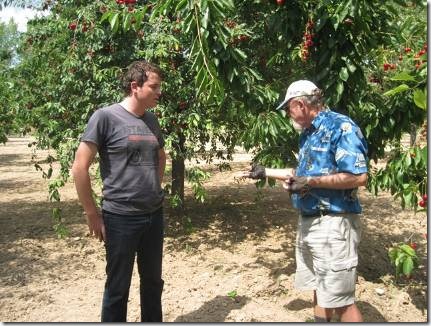If some of you didn’t get the photos from my last email, check the website and they will be there. Not sure what happened. This email starts the story of our visit to the town of Guneykent.
I hope it comes across how much we enjoyed our visit and really appreciate everyone who made it possible. Emre and Ahmet took us to visit a family in Guneykent who had a small distillation operation and I’ll write about that next email.
Ru
DoraMac
Guneykent part 1
During the months of May and June there are official organized tours of rose fields and rose petal processing plants. But arriving in Isparta in July, we were too late for that. Lonely Planet mentions the Gulbirlik Company as an option for tours that you might arrange on your own. I emailed them and was told that the season had ended but if we came to the cosmetics factory in Isparta they could possibly arrange something. I pretty much said that we had only the one day and had come so far because of the roses so we’d show up and take what we could get. The email from Gulbirlik’s Ahmet Doganer (from his Turkcell Blackberry) had included the address and with just a little help from some local Ispartans, we arrived on time, 10 am. We were ushered upstairs to a set of offices and told to wait, that Ahmet was expecting us and would be there shortly. Ahmet was very welcoming, but also very apologetic that there was not much to see. We went outside where there were examples of distillation equipment and he explained them and gave us some statistics but really couldn’t do more than that.
The outside of the Gulbirlik building where Ahmet is explaining the distillation process to Randal.
Gul means rose and according to the Google translator birlik means unity or alliance. “Established in 1954, Gulbirlik is now made up of 6 separate cooperatives with 8,000 producer partners, 4 rose oil plants at 4 different locations and 2 rose oil solid plants. It processes 320 tons of rose flowers per day during the season….” www.gulbirlik.com/eng/aboutus.asp
The “stills” reminded me of the Tin Man from the Wizard of Oz and Franklin County, VA with its history of moonshine!
We were appreciative that the Gulbirlik Company made any time for us at all, but disappointed because we thought we’d be shown the factory at work. We had stayed an extra day in Egirdir just for this “tour.” But Isparta is also known for carpets so we biked into the city center and saw a side of Isparta we’d missed during our late afternoon bike through two days earlier. It looked quite appealing and interesting so our mood changed pretty quickly. We had a listing of tourism offices in cities throughout Turkey and showed the Isparta listing to people on the street who directed us along until we finally found the location that matched the address. Lucky for us the address was for government offices and not tourism offices. You can get the best help and friendly welcome at any gas station in Turkey: you just can’t get that kind of reception at the tourism offices. That’s why I say we were lucky we got to the wrong place. The office address actually belonged to Bulent Akbas, Traffic Regulation Branch Police Department Deputy. Bulent spoke fluent English and he was truly interested in helping us. First he was going to tell us how to get to the tourism office. Then he was going to take us..and then he asked why we were going, what did we want to know? When we told him of our interest in the rose field and industry, he went into action. He told us to sit, offered us tea or water. Next he called his friend, the Mayor of Guneykent to arrange a tour of the rose fields for us. It took a few minutes and a call back as I remember, but in less time than it would have taken us to find the actual Isparta Tourism Office, Bulent had arranged our rose field tour in the small town of Guneykent! We thanked him with all our hearts, what else could you do in a situation like that. Bulent had told us that during his time as a UN Peacekeeper (gave me chills just to hear him say that) he had met Americans who had become friends. Thanks to his caring enough to help us, Randal and I had the best day of our motorbike trip and one of our best days in Turkey.
Bulent Akbas explaining to Randal how to get from Isparta to Guneykent.
Bulent had said we could get to Guneykent in 30 minutes, but speeding would take 20 minutes. ( I guess he was kidding.) At any rate, at our speed it took nearly an hour. When we arrived it seemed as if the entire town had been waiting for us! I wish I could replay exactly what happened but I can’t, just that there was a welcoming committee and soon we were sitting under a shady tree drinking tea and eating cookies with the Mayor and our guides Emre and Ahmet.
Mayor Fahretdin Gozgun at his desk.
I managed not to get any of my own photos of the Mayor. I’d thought we’d see him later in the afternoon at lunch, but unfortunately we didn’t so I “borrowed” this one from the Guneykent website.
The Mayor was a very charming man and maybe one day his picture will be hanging up next to Ataturk’s all over Turkey. Mayor Gozgun is also a petroleum and natural gas engineer. He sat with us while we drank several cups of refreshing Turkish tea and then he handed us off to our guides Emre and Ahmet.
We also met these young men who gave us a brochure about Bediuzzaman Said Nursi which will teach us about modern Turkish history as well as increase our knowledge about Islamic thought (of which we have very little.)
Guneykent center.
Yunus Emre: Poet, Sufi, Dervish 1240? to 1221? Statue was in the small town park where we had tea.
“His beliefs were rooted in religion, and he was undeniably an Islamic Sufi, but his philosophy was independent and he taught that every belief and every idea, religious or otherwise, that leads to the creator is sacred.” http://adnantuncel.com/yunus.html
For those who truly love God and his ways
All the people of the world are brothers.
We regard no one’s religion as contrary to ours,
True love is born when all faiths are united as a whole.
True faith is in the head, not in the headgear.
You better seek God right in your own heart
He is neither in the Holy Land nor in Mecca
Our guide Emre Yalcinkaya
(Without a Turkish keyboard I’m not actually spelling his last name correctly but that’s the best I can do. Bulent’s name and the Mayor’s have also been Anglicized by my keyboard.)
Emre’s family was originally from Guneykent but had moved to Isparta when Emre was a young boy. Lucky for us he was on summer holiday from university in Istanbul where he is studying industrial engineering and even luckier for us he was in Guneykent to visit his aunt and have some of her “famous soup” which she had made that day.
We left our motorbike in town and hopped into an official Guneykent vehicle to be driven to the rose fields.
Both Emre (1,000 sq meters) and Ahmet (1,005 sq meters) own rose fields and here give Randal some facts and figures about the industry. Emre said that he worked picking petals as a young boy. I made some comment that it was the reason he wanted to be an industrial engineer and get out of the fields. He told me just the opposite, that rose fields earn good money!
Ahmet worked for the town of Guneykent and was our driver.
Once I got started I didn’t want to stop.
These roses are after the season and we were told we could pick as many as we wanted!
After our day in the rose fields, we were treated to lunch. On the way to the restaurant we stopped to visit Emre’s family’s cherry orchard. We tasted the sour cherries and the sweet cherries. They also had peach trees. Emre’s dad teaches elementary school in Isparta. His mom takes care of his dad and him when he’s home. His older sister is working on her Ph.D. in industrial engineering but now is on maternity leave.
Emre also taught me about Turkish hugging. When it was time for Randal and me to head on back to Egirdir, a handshake and thanks didn’t seem enough. I asked Emre if I could give him a big hug. He said yes and I hugged him and then stepped away. But he taught me that two hugs are given in Turkey, the way the Europeans kiss on both cheeks. Two hugs are good! I promised to remember that but haven’t met anyone else yet who inspires any from me.
While in Guneykent we visited a local family to see their rose petal processing operation, but that’s for part 2.
These websites will give you more information about Isparta, Guneykent and the rose industry. On my computer Google automatically translates the pages from Turkish if that’s their original language.
http://www.ispartahem.gov.tr/english/isparta_city.htm Information about Isparta
http://www.gulbirlik.com/ One of the main producers of rose water and rose oil products
http://www.guneykent.bel.tr/ The official website of Guneykent
http://gular.sdu.edu.tr/index_en.php Great site to learn about rose industry
http://gular.sdu.edu.tr/index_en.php?dosya=roseoil&tur=2 Explains the distillation process
"Gülbirlik, founded as a union of cooperatives in 1954 in the ‘world of roses’ of Isparta, operates with some 8,000 producer-partners in Turkey. The union has come to control 40 percent of the world’s rose oil market since overtaking Bulgaria in rose oil exports in 2004 and 2005……
The rose blossoms are picked from very early in the morning (when they open) until 10-11 a.m. Later in the day the oil contained in the rose petals loses its delicate aroma. The amount of rose blossoms collected daily by one worker is about 20-25 kg, 30 kg may only be picked by a very skilled hand. The flowers are gathered by holding the petals with three fingers and gently lifting up the blossom before picking it off. A Put in sacks and stored in a shady place, the blossoms are transported to the rose distilleries as quickly as possible in order to obtain a maximum quantity of essential a oil
The distilling installation consists of a still, a steam-leading pipe, a cooling container and vessels for collecting the produce – rose oil and rose water. The overall distillation process takes about two hours. On the average, 3.5 tons of rose blossoms are needed to produce 1 kg of rose oil. Depending on the quality of flowers and the method of distillation, however, yields can vary between 3.0 and 5.0 tons (which equals more than one million flowers) to produce just 1 kg of rose oil. Following the distillation, the droplets of pure rose oil left floating on the surface of the condensed liquid are separated from the rose water using special equipment.
Oil rose is the main source of the rose oil and other materials including concrete, absolute and rose water, the most important commercial products especially in the flavour and fragrance industry. Rose oil is produced by water steam distillation of fresh rose flowers. Concrete is a waxy product extracted from fresh rose flowers with volatile solvents. Absolute and bioabsolute are alcohol extracts of the concretes from fresh and residue flowers, respectively. Rose water is a byproduct obtained during the distillation of rose flowers.
Rose Oil and Rose Oil By-Products
Rose oil is extracted from rose blossoms of Rosa Damascena through water distillation. Its fragrance is extremely potent.
Rose concrete is obtained from the fresh flowers of the Bulgarian oil-bearing rose (Rosa damascena) through petroleum-ether extraction.
Rose absolute is extracted from rose concrete. It is a red liquid mainly used in perfumery.
Rose water is a by-product obtained during the distillation process of attar of roses, this is why it contains 0.04 up to 0.05 per cent of pure rose oil.
Rose water concentrate is a by-product of rose oil distillation containing 0.08 per cent of the precious essence.
Rose essence is the "progenitor’s genome" of any top perfume. It has no other fragrances. The aroma is unique – one of roses. Genuine roses. For it contains natural rose oil

